 “THE HOUR OF INDEPENDENCE OF THE STATE OF PALESTINE HAS ARRIVED” – MAJORITY OF THE UN MEMBER STATES HAVE RECOGNIZED PALESTINE AS A STATE
“THE HOUR OF INDEPENDENCE OF THE STATE OF PALESTINE HAS ARRIVED” – MAJORITY OF THE UN MEMBER STATES HAVE RECOGNIZED PALESTINE AS A STATE
by Syarif Hidayat*
Palestinian President Mahmoud Abbas, in a speech to the U.N. General Assembly in New York, on September 26, 2014 demanded an end to Israeli occupation, telling the United Nations that the time for Palestinian independence had come and calling on the world community to support his bid for membership in the UN and for statehood, describing it as support for truth. As of 30 October 2014, the majority of the 193 member states of the United Nations, 135 (69.9 percent) with their total population is over 5.5 billion people, equaling 80 percent of the world’s population, have recognized Palestine as a state.
Abbas also vowed to seek war crimes prosecutions against Israel over what he called the 50-day “war of genocide” in Gaza that killed 2,140 Palestinians, mostly civilians, and left the enclave in ruins. “There is an occupation that must end now. There is a people that must be freed immediately,” Abbas said in an address to the U.N. General Assembly in New York. “The hour of independence of the state of Palestine has arrived.” Abbas, however, did not set a deadline for fast-tracking to Palestinian statehood, after aides suggested they were eyeing 2017 as a possible date.
Also Read: The Forty-Four-Days of Glory: Azerbaijan’s Struggle for Justice and Peace
The international recognition of the State of Palestine has been the objective of the Palestine Liberation Organization (PLO) since the Palestinian Declaration of Independence proclaimed the establishment of the State of Palestine on 15 November 1988 in Algiers at an extraordinary session in exile of the Palestine National Council. The declaration was promptly acknowledged by a range of countries, and by the end of the year the state was recognised by over 80 countries. In February 1989, at the United Nations Security Council, the PLO representative claimed recognition by 94 states.
As part of an attempt to resolve the ongoing Israeli–Palestinian conflict, the Oslo Accords signed between Israel and the Palestine Liberation Organization (PLO) in September 1993 established the Palestinian National Authority (PNA) as a self-governing interim administration in the Palestinian territories. Israel does not recognise Palestine as a state and maintains de facto military control in the territories even in areas officially under the government of the PNA.
Many of the countries that do not recognise the State of Palestine nevertheless recognise the PLO as the “representative of the Palestinian people”. Israel and a number of other countries do not recognize Palestine, taking the position that the establishment of this state can only be determined through direct negotiations between Israel and the PNA. The main issues currently obstructing an agreement are: borders, security, water rights, the status of Jerusalem and freedom of access to religious sites, ongoing Israeli settlement expansion, and legalities concerning Palestinian refugees including the right of return.

State of Palestine
. " width="423" height="237" /> As of 30 October 2014, 135 (69.9%) of the 193 member states of the United Nations have recognised the State of Palestine.69.9 percent of UN members have recognized Palestine
Also Read: Palestine Solidarity Month: A Collective Movement for Al-Aqsa and Palestine’s Freedom
The end of October 2014, Sweden became the 135th member of the United Nations to officially recognize Palestine as an independent state. The act sparked a tetchy diplomatic incident with Israel. This development indicated that of the 193 member states of the United Nations, 135 (69.9 percent) have recognized the State of Palestine as of 30 October 2014. Their total population is over 5.5 billion people, equaling 80 percent of the world’s population.
On the ground, a separate, viable Palestinian state is far from a reality. Israel occupies the West Bank and East Jerusalem, and it partially blockades the Gaza Strip, the territories that would comprise it. The continued expansion of Israeli settlements into the West Bank makes tackling the question of Palestinian sovereignty all the more difficult. So, too, the apparent collapse of talks between the Israeli government and its Palestinian interlocutors.
Sweden’s Foreign Minister Margot Wallstrom said her government’s decision was aimed at supporting the Palestinian Authority and its beleaguered President Mahmoud Abbas, particularly given the present tensions in Jerusalem. “It is important to support those who believe in negotiations and not violence,” she told Al Jazeera. “This will give hope to young Palestinians and Israelis that there is an alternative to violence.”
In the absence of progress in negotiations with Israel, Abbas has taken the Palestinians’ case to the United Nations in recent years. The effort is mostly symbolic — a bid to deepen the political isolation of the right-wing government of Israeli Prime Minister Benjamin Netanyahu.
Also Read: Hassan al-Turabi: A Controversial Thinker from Sudan
Sweden’s move reflects a wider European frustration with Benjamin Netanyahu. This week, French socialist lawmakers said they were preparing a bill calling on the government to recognize Palestine. In mid-October, British lawmakers overwhelmingly passed a motion indicating “that the Government should recognise the state of Palestine alongside the state of Israel, as a contribution to securing a negotiated two state solution.”
The motion is nonbinding, but serves as one more sign of Europe’s growing impatience with the Mideast status quo. The United States would want to see the two-state solution come into fruition before conferring official recognition upon Palestine. But that is, at present, a naive hope: A number of prominent ministers in Netanyahu’s government reject outright the possibility of the two-state solution ever being realized.
Before Sweden’s decision, tiny Iceland was the only Western European country to recognize Palestine.
Sweden King congratulates national day of ‘State of Palestine’
Also Read: Who Exactly is the RSF Group Shaking Sudan?
The king of Sweden has congratulated the national day of the “State of Palestine” to become the first European monarch to officially mark the Palestinian 1988 declaration of independence. “On the occasion of the National Day of the State of Palestine, I wish to convey to your Excellency my best wishes for your health and happiness and for the prosperity of the people of the State of Palestine,” King Carl XVI Gustaf wrote in a Saturday letter to Palestinian President Mahmoud Abbas.
The Palestinians consider November 15 as their national day after they declared an independence state within the 1967 borders. The letter came days after Sweden became the first major European state to officially recognize Palestine as an independent state amid fury from the Israeli regime over the move.
Sweden has joined 130 other nations, including Hungary, Poland, and Slovakia, that had already made a similar decision. The Israeli regime has been sorely irked by the move. In response to Sweden’s recognition of Palestine, Israeli Foreign Minister Avigdor Lieberman said in October that “the Swedish government should understand that Middle East relations are more complex than a piece of self-assembled IKEA furniture, and the matter should be handled with responsibility and sensitivity.”
Avigdor’s Swedish counterpart Margot Wallstrom was unmoved by the analogy, saying, “I will be happy to send Israel FM Lieberman an IKEA flat pack to assemble. He’ll see it requires a partner, cooperation and a good manual.” Hugh Lovatt, the Israel/Palestine Project coordinator at European Council on Foreign Relations, said that more European countries are expected to follow in Sweden’s footsteps and recognize Palestine as an independent state. Lovatt noted that European states are taking a more pro-Palestinian stand as they believe that Israeli Prime Minister Benjamin Netanyahu is not interested in peace with the Palestinians.
Also Read: The Two-State Solution (Palestine–Israel) in Historical Perspective
On 29 November 2012, the UN General Assembly passed a motion changing Palestine’s “entity” status to “non-member observer state” by a vote of 138 to 9, with 41 abstentions. The observer state status grants Palestinians access to UN agencies and the International Criminal Court (ICC), where they can file formal complaints against the Israeli regime.
Palestinians are seeking to create an independent state on the territories of the West Bank, East al-Quds (Jerusalem), and the Gaza Strip and are demanding that Israel withdraw from the occupied Palestinian territories.
Israel, however, has refused to return to the 1967 borders and is unwilling to discuss the issue of al-Quds.
EU is directly building support for Palestine
European Union states are working against Israeli expansion and for the recognition of Palestine, a commentator tells Press TV. “British parliament last month passed with a very big majority a bill to recognize the Palestinian state. The Irish parliament did the same. Sweden joined the group that recognizes Palestine.
Also Read: Enchanted by K-Dramas, Dragged into Slander: Time for Muslims to Rise!
Poland had already done so in the past, and apparently France and Spain are going to join and so there seems to be a momentum and this time hopefully it will produce some results,” Farhang Jahanpour, a professor at the University of Oxford said in an interview with Press TV. “It is significant that the EU and many Euro countries have now got directly involved, including their foreign policy chief,” Jahanpour added.
The European Union’s new foreign policy chief, Federica Mogherini, appointed recently, immediately traveled to visit Israeli leaders. Mogherini slammed the Israeli regime’s approval for the construction of 278 new illegal settler units in East Jerusalem al-Quds, saying Tel Aviv’s land grab plans are an obstacle to the peace process between Israelis and Palestinians.
The remarks come at a time when the EU has decided to ban imports of dairy products made in Israeli settlements of the occupied West Bank as of January, 2015. In June, a similar ban was applied to poultry.

An UNGA resolution was adopted “acknowledging the proclamation of the State of Palestine by the Palestine National Council on 15 November 1988.”By mid-December, 75 states had recognised Palestine, rising to 93 states by February 1989.
Palestinian Declaration of Independence
Also Read: Creating Opportunity and Avoiding Misery; Lesson Learn on Waste Recycling Issue
The Palestinian Declaration of Independence is a statement written by Palestinian poet Mahmoud Darwish and proclaimed by Yasser Arafat on 15 November 1988. It had previously been adopted by the Palestinian National Council, the legislative body of the Palestine Liberation Organization (PLO), by a vote of 253 in favour 46 against and 10 abstentions. It was read at the closing session of the 19th Palestinian National Council to a standing ovation. Upon completing the reading of the declaration, Arafat, as Chairman of the Palestine Liberation Organization assumed the title of “President of Palestine.”
On 28 October 1974, the 1974 Arab League summit held in Rabat designated the PLO as the “sole legitimate representative of the Palestinian people and reaffirmed their right to establish an independent state of urgency.”
Legal justification for the declaration was based on United Nations General Assembly Resolution 181 (II) of 29 November 1947, which provided for the termination and partition of the British Mandate into two states. Despite the proclamation of the State of Palestine, at the time the Palestine Liberation Organization did not exercise control over any territory, and designated Jerusalem as the capital of Palestine,[i] which was under Israeli control and claimed by it as Israel’s capital. Though recognised by over 100 countries, no de facto independent Palestinian state has come into existence in the Palestinian territories.
Significance
Also Read: Between the Treaty of Hudaybiyyah and Ceasefire in Gaza
The declaration concerns the Palestine region, as defined by the British Mandate of Palestine, which includes the whole of Israel as well as the West Bank and the Gaza strip. It references the United Nations Partition Plan for Palestine of 1947 (which also serves as the basis for Israel’s declaration of independence) and “UN resolutions since 1947” in general. It invokes the Partition Plan as providing legitimacy to Palestinian statehood, at which time the Palestinian Arab leadership refused to accept the partition resolution (as opposed to the Jewish Agency (which would later form the nucleus of the State of Israel), which accepted the Partition Plan).
The declaration does not explicitly recognize the State of Israel. However, an accompanying document that explicitly mentions UN Security Council Resolution 242 and Yasser Arafat’s statements in Geneva a month later were accepted by the United States as sufficient to remove the ambiguities in the declaration. Based on these statements, the declaration can be interpreted to have recognized Israel in its pre-1967 boundaries.
The declaration’s reference to Palestine being the “land of the three monotheistic faiths” has been held as recognising the Jewish historical connection to the land, instead of arguing that Jews are colonists and foreigners in the land. Referring to “the historical injustice inflicted on the Palestinian Arab people resulting in their dispersion and depriving them of their right to self-determination,” the declaration recalled the Treaty of Lausanne (1923) and UN General Assembly Resolution 181 as supporting the rights of Palestinians and Palestine.
The declaration then proclaims a “State of Palestine on our Palestinian territory with its capital Jerusalem”. The borders of the declared State of Palestine were not specified. The population of the state was referred to by the statement: “The State of Palestine is the state of Palestinians wherever they may be”. The state was defined as an Arab country by the statement: “The State of Palestine is an Arab state, an integral and indivisible part of the Arab nation”.
Also Read: Peace Cannot Be Achieved Without a Palestinian State
Consequences
The declaration was accompanied by a PNC call for multilateral negotiations on the basis of UN Security Council Resolution 242. This call was later termed “the Historic Compromise”, as it implied acceptance of the “two-state solution”, namely that it no longer questioned the legitimacy of the State of Israel. The PNC’s political communiqué accompanying the declaration called only for withdrawal from “Arab Jerusalem” and the other “Arab territories occupied.” Yasser Arafat’s statements in Geneva a month later were accepted by the United States as sufficient to remove the ambiguities it saw in the declaration and to fulfill the longheld conditions for open dialogue with the United States.
As a result of the declaration, the United Nations General Assembly (UNGA) convened, inviting Yasser Arafat, Chairman of the PLO to give an address. An UNGA resolution was adopted “acknowledging the proclamation of the State of Palestine by the Palestine National Council on 15 November 1988,” and it was further decided that “the designation ‘Palestine’ should be used in place of the designation ‘Palestine Liberation Organization’ in the United Nations system.” One hundred and four states voted for this resolution, forty-four abstained, and two – the United States and Israel – voted against. By mid-December, 75 states had recognised Palestine, rising to 93 states by February 1989.
The Palestine Basic Law, approved by the PLC in May 2002, states unambiguously “Jerusalem is the Capital of Palestine”. Ramallah is the administrative capital where government institutions and foreign representative offices of Australia, Brazil, Canada Colombia, Czech Republic, Denmark, Finland, Germany, Malta, the Netherlands, South Africa, and Switzerland are located. Jerusalem’s final status awaits future negotiations between Israel and the Palestinian Authority (see “Negotiating Jerusalem”, University of Maryland). The United Nations and most countries do not accept Israel’s claim over the whole of Jerusalem (see Kellerman 1993, p. 140) and maintain their embassies to Israel in other cities (see the CIA Factbook).
Also Read: Facing the Wall: Netanyahu and Ambitions Built on Blood
The State of Palestine (Arabic: دولة فلسطين Dawlat Filasṭīn) is a de jure sovereign state in the Levant. Its independence was declared on 15 November 1988 by the Palestine Liberation Organization (PLO) in Algiers as a government-in-exile. The State of Palestine claims the West Bank and Gaza Strip, and has designated Jerusalem as its capital,[ii] with partial control of those areas assumed in 1994 as the Palestinian Authority. Most of the areas claimed by the State of Palestine have been occupied by Israel since 1967 in the aftermath of the Six-Day War. The State of Palestine applied for full UN Membership in 2011; and in 2012 was recognized as a non-member observer state by the United Nations.
The October 1974 Arab League summit designated the PLO as the “sole legitimate representative of the Palestinian people” and reaffirmed “their right to establish an independent state of urgency.” In November 1974, the PLO was recognized as competent on all matters concerning the question of Palestine by the UN General Assembly granting them observer status as a “non-state entity” at the UN. After the 1988 Declaration of Independence, the UN General Assembly officially “acknowledged” the proclamation and decided to use the designation “Palestine” instead of “Palestine Liberation Organization” in the UN. In spite of this decision, the PLO did not participate at the UN in its capacity of the State of Palestine’s government.
In 1993, in the Oslo Accords, Israel acknowledged the PLO negotiating team as “representing the Palestinian people”, in return for the PLO recognizing Israel’s right to exist in peace, acceptance of UN Security Council resolutions 242 and 338, and its rejection of “violence and terrorism”. As a result, in 1994 the PLO established the Palestinian National Authority (PNA or PA) territorial administration, that exercises some governmental functions[iii] in parts of the West Bank and the Gaza Strip.
In 2007, the Hamas takeover of Gaza Strip politically and territorially divided the Palestinians, with Abbas’s Fatah left largely ruling the West Bank and recognized internationally as the official Palestinian Authority, while Hamas has secured its control over the Gaza Strip. In April 2011, the Palestinian parties signed an agreement of reconciliation, but its implementation had stalled until a unity government was formed on 2 June 2014.
On 29 November 2012, in a 138-9 vote (with 41 abstentions and 5 absences), the United Nations General Assembly passed resolution 67/19, upgrading Palestine from an “observer entity” to a “non-member observer state” within the United Nations system, which was described as de facto recognition of the PLO’s sovereignty. Palestine’s new status is equivalent to that of the Holy See; similarly, Switzerland was a non-member observer state for more than 50 years (until 2002). The UN has permitted Palestine to title its representative office to the UN as “The Permanent Observer Mission of the State of Palestine to the United Nations”, and Palestine has instructed its diplomats to officially represent “The State of Palestine”—no longer the Palestinian National Authority.
On 17 December 2012, UN Chief of Protocol Yeocheol Yoon declared that ‘the designation of “State of Palestine” shall be used by the Secretariat in all official United Nations documents’, thus recognising the title ‘State of Palestine’ as the state’s official name for all UN purposes.
As of 30 October 2014, 135 (69.9%) of the 193 member states of the United Nations have recognised the State of Palestine. Many of the countries that do not recognise the State of Palestine nevertheless recognise the PLO as the “representative of the Palestinian people”. The PLO’s Executive Committee is empowered by the Palestinian National Council to perform the functions of government of the State of Palestine. On 25 May 2014 during his visit to the Holy Land, Pope Francis, in a carefully worded statement, made explicit reference to the “State of Palestine”.
Proposals for a Palestinian state
Proposals for a Palestinian state refers to the proposed establishment of an independent state for the Palestinian people in Palestine on land that was occupied by Israel since the Six-Day War of 1967 and prior to that year for 18 years (1949) by Egypt (Gaza) and by Jordan (West Bank). The proposals include the Gaza Strip, which is controlled by the Hamas faction of the Palestinian National Authority, the West Bank, which is administered by the Fatah faction of the Palestinian National Authority, and East Jerusalem which is controlled by Israel under a claim of sovereignty.
The proclaimed State of Palestine is recognized by 135 countries. The Israeli military commander exercises usufructuary rights in accordance with international law, but it is not the legal sovereign of the disputed territory. The permanent sovereignty of the Palestinian people over the natural resources of the Palestinian territories has been recognized by 139 countries and Palestine is recognized by the UN as a non member state. Under agreements reached with Israel, the Palestinian Authority exercises de jure control over many natural resources, while interim cooperation arrangements are in place for others.
Historical background
At the dissolution of the Ottoman Empire following World War I, the victorious European states divided many of its component regions into newly created states under League of Nations mandates according to deals that had been struck with other interested parties. In the Middle East, Syria (including the Ottoman autonomous Christian Lebanon and the surrounding areas that became the Republic of Lebanon) came under French control, while Mesopotamia, and Palestine (including what became Jordan and Israel) were allotted to the British.
Arab nationalism was on the rise after World War II, possibly following the example of European nationalism. Pan-Arabist beliefs called for the creation of a single, secular state for all Arabs.
Most of these states achieved independence during the following three decades without great difficulty, though in some regimes, the colonial legacy continued through the granting of exclusive rights to market/manufacture oil and maintain troops to defend it. However, the case of Palestine remained problematic. (T/P3/R01)
Mi’raj Islamic News Agency (MINA)
 *Senior Editor of Mi’raj Islamic News Agency (MINA) (He can be contacted via emails: [email protected] and [email protected])
*Senior Editor of Mi’raj Islamic News Agency (MINA) (He can be contacted via emails: [email protected] and [email protected])
Bibliotheque:
1.http://www.washingtonpost.com/
2.http://qz.com/276164/
3. http://en.wikipedia.org/wiki/Palestinian_Declaration_of_Independence
4. http://www.presstv.ir/





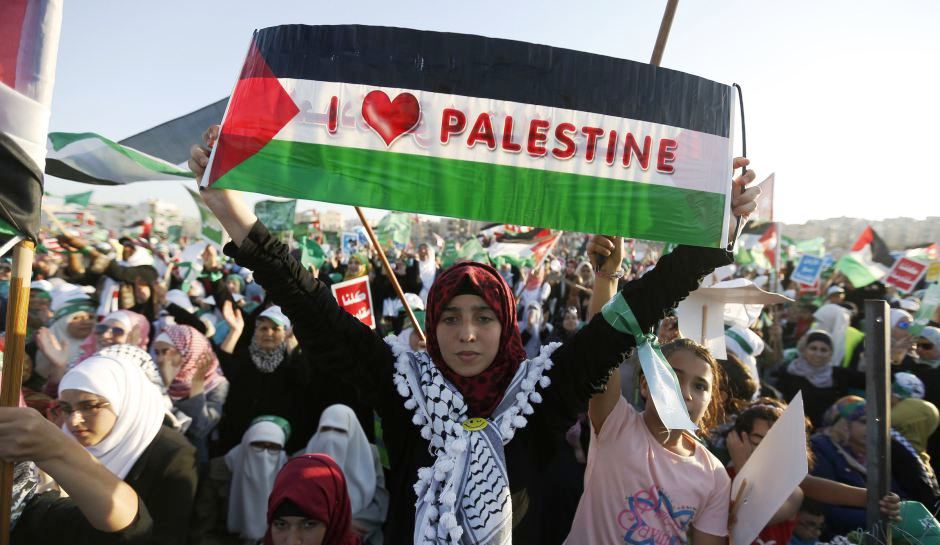







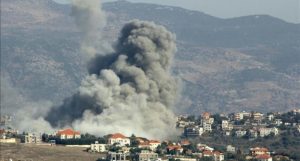

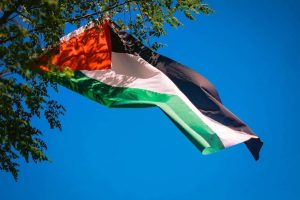
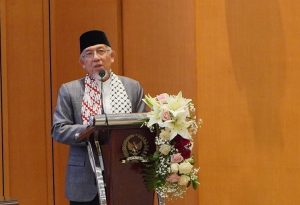


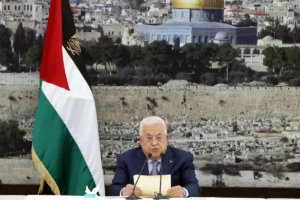












 Mina Indonesia
Mina Indonesia Mina Arabic
Mina Arabic